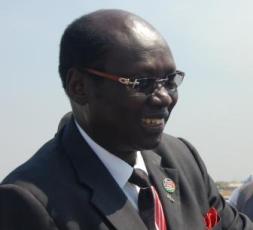South Sudan refutes claims that oil revenues have been paid in hard currency
August 28, 2010 (RENK) – The regional government of southern Sudan on Saturday repeated its denial that July and Augusts’ oil revenue was transferred to them by the central bank of Sudan in US dollars or any other hard currency.

On 24 August the governor of Central Bank of Sudan, Sabir Mohamed Hassan, said the south’s share of oil revenue in July and August was paid in hard currency and that the south’s claims to the contrary were false.
Hassan’s statement came after south Sudan’s minister of finance and economic planning, David Deng Athorbei, said that Sudan’s central bank had unilaterally started making oil payments in local currency.
Barnaba Marial Benjamin, minister of information and broadcasting in the southern regional government told Sudan Tribune on Saturday that no oil revenues had been received in hard currency by Bank of South Sudan (BoSS) from Central Bank of Sudan.
“Our minister of finance here [in Juba the southern capital] has repeatedly told the council of ministers [that] receipt of the oil revenues for July and August [was] in local currency not hard currency”, said Benjamin.
The minister who is also the official spokesperson of the Government of Southern Sudan (GoSS) said he could not understand why the central bank governor continued to contradict the southern government’s claim that recent payments have been made Sudanese Pound (SDP).
“Why is the central bank insisting that transfer of the two months oil revenues has been done when in fact nothing has been transferred and received?”, he asked adding that he believed the people of south Sudan have started losing trust in the central bank’s governor.
“All what the central bank governor is saying is not correct. We have not received our share of the oil revenue in hard currency’’, Benjamin said.
The central banks governor has also refuted the south’s claims that they are running out of foreign currency. According to Hassan the Bank of Southern Sudan (BoSS) has reserves of up to US$726 million, twice the amount he says that the Central Bank possesses.
Elijah Malok Aleng, deputy governor of the Central Bank of Sudan and a governor of BoSS denied this. After a briefing with south Sudan’s president on Friday, he told South Sudan TV (SSTV) that south Sudan’s reserves were less than half what the central bank claimed.
“We only have a reserve of about US$300 million”, he said.
According to Aleg the amount of foreign exchange reserves should not influence whether the south is paid in hard currency or not, as it was agreed in the 2005 peace accord between the Sudan People’s Liberation Movement (SPLM) – who now govern the south – and the ruling National Congress Party (NCP).
“Transfer share of the oil revenues cannot be stopped or determined by the level of reserve[s] in the Bank of South Sudan but on the basis of the entitlement in accordance with provision of the agreement on wealth sharing,” Aleng said.
On Monday 23 August, Athorbe the southern finance minister told a press conference that the central bank’s action was starving the economy of southern Sudan of the hard currency it desperately needs to operate.
“The foreign exchange needed by the business community to pay for imports and to meet their foreign currency obligations and commitments cannot be provided. Investor confidence in southern Sudan is eroded as we cannot meet their foreign exchange requirements. The public is unable to send money to their families abroad for school fees or any other purpose’’, Athorbei said.
The Sudanese pound has been showing signs of appreciation against major currencies this week after its value dropped a month ago.
This is latest disagreement between the partners of the Comprehensive Peace Agreement comes months before the south is due to vote on whether it wants to remain united with the north or form a new country.
(ST)

Wal P Muoranyar Biet
South Sudan refutes claims that oil revenues have been paid in hard currency
Hard or soft people of Southern Sudan need clarifications!
Wal P Muoranyar Biet
Gatluak Latjor
South Sudan refutes claims that oil revenues have been paid in hard currency
Hahaha, every thing was sent in local currency , khartoum has already started behaving like a kid , this is how the NCP disobey agreements, South Sudan should draw its guns near.